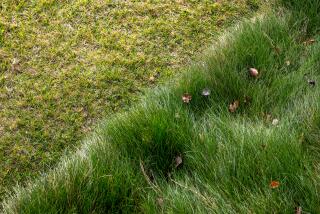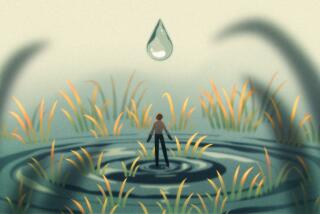Lawns May Hark to Man’s Origin
- Share via
Scientists say it may well be an anthropological time machine, a link between the 20th Century and the time when ape-men roamed the earth.
You may know it as your front yard.
The common lawn has raised the interest of more than just homeowners, gardeners and companies who make weed killer. Curious about modern man’s obsession with green grass, science has begun to explore the historic and sociological aspects of the manicured lawn.
Dr. John Falk, a Smithsonian Institution ecologist, believes people may be drawn to lawns by a primordial urge passed down from an era thousands of years ago when humanoids sought out the comfort and safety of the savanna grasslands of East Africa.
“I’m arguing that it’s genetic. We spent 98% of our evolutionary history in those savanna-like environments,” Falk said. “Our habitat preference for short grass and scattered trees seems to be a vestige of that history.”
People Preferred Savannas
To support his belief that modern man inherently prefers the grassy environment his primitive ancestors chose, Falk interviewed people from Africa, India, the United States and other countries. He showed them paired photographs of differing landscapes: deserts, forests, mountain lands and savannas. This research, conducted several years ago, showed that, no matter where the people came from, they preferred the savannas as a place to live, even though many had never seen such terrain before.
“Until the day we unravel how DNA works, a lot of this is conjecture,” Falk said. “But my sense is that a lot of the things we consider to be human behavior are products of that savanna evolution.”
Another prevalent theory regarding man’s desire for a green lawn dates back to a time not so far back, said Victor Gibeault, a University of California horticultural environmentalist. In the Middle Ages, feudal lords cropped the fields around their castles to thwart sneak attacks and provide grazing land for horses and cattle. These fields became equated with wealth and social position.
Lawns Became Status Symbols
Manor lords in decades to follow installed lawns as a status symbol, Gibeault said. The theory holds that the grand, manicured lawns of English castles and French chateaux have since been translated into today’s front yard.
Both researchers concede that some of what moves the modern urbanite to work at keeping his lawn green may be no more than a desire to keep up with the neighbors.
More to Read
Sign up for Essential California
The most important California stories and recommendations in your inbox every morning.
You may occasionally receive promotional content from the Los Angeles Times.














